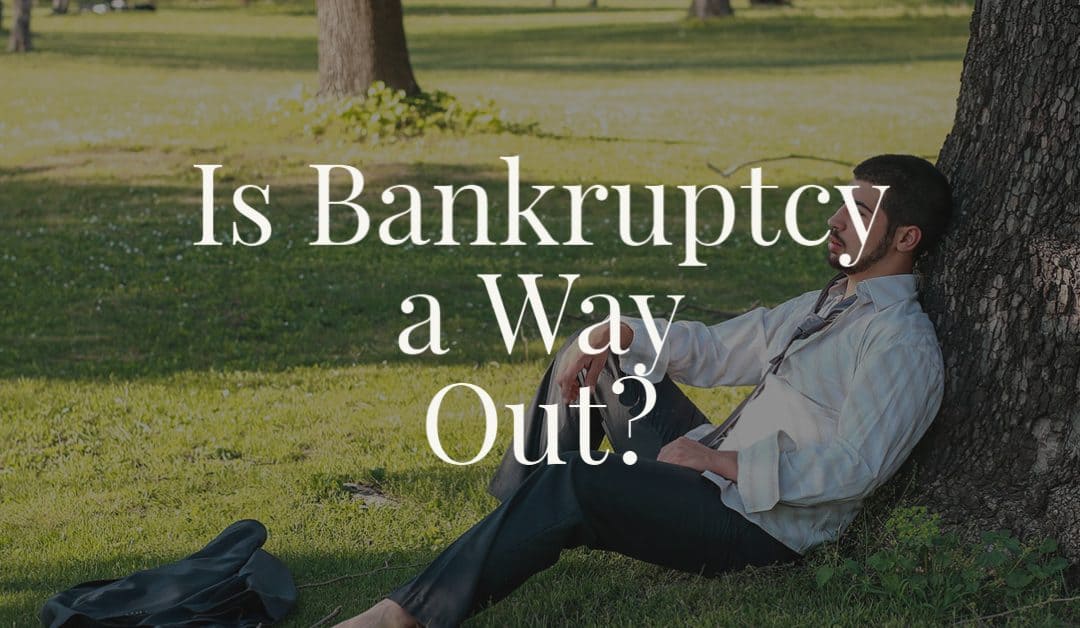If you are behind on your bills and wondering what to do, you are not alone. According to the Consumer Financial Protection Bureau’s recent report, “ Over 11 million families are behind on their rent or mortgage payments: 2.1 million families are behind at least three months on mortgage payments, while 8.8 million are behind on rent.”
Many have a home mortgage or student loans and a car payment but lost their job during the pandemic and are looking for a way forward. Thinking about bankruptcy as a clean start can make an attractive option, but is it the panacea you hope for?
There are different kinds of bankruptcy, but the two most common are Chapter 7 and Chapter 13. Depending on your specific needs and situation, your attorney can recommend the best type of bankruptcy for you.
Let’s look at what bankruptcy can and can’t do for you.
What is Bankruptcy?
Bankruptcy is a court proceeding that compares your assets to your debts. The judge may decide that you do not have the means to pay any of your debt, or the judge could decide that you can repay some of your debt with a repayment plan. Filing any bankruptcy has long-term credit eligibility consequences and is not something to go into lightly.
Bankruptcy Is Limited
Many believe that bankruptcy wipes away every debt so that you can start clean. However, there are some types of debts that are not affected by either type of bankruptcy. If you owe federal or state tax, child support payments, or student loans, these are generally not discharged in bankruptcy.
Student loans can occasionally be discharged if you can prove to the court that continuing to pay this debt will cause “undue hardship” to your family. You must show proof of your “undue hardship” during your proceeding for student loan debt discharge. An experienced consumer rights attorney can help you make a case for your hardship.
Chapter 7 Bankruptcy
With Chapter 7 bankruptcy, all of your past due accounts remain on your credit record but have a balance of 0. Credit reports label your debts “Discharged.” These discharges include any loans or outstanding debt such as credit cards or medical debt. If you are one of the millions in the US with medical debt weighing heavy on you, this option can look attractive indeed.
Chapter 7 bankruptcy will not prevent a foreclosure on your home. However, once you file for Chapter 7 bankruptcy, the court will stop the foreclosure while your bankruptcy case is pending. After bankruptcy, your foreclosure will proceed, but you avoid debt that you might have incurred had you not declared bankruptcy. In other words, filing bankruptcy during a foreclosure can prevent you from having to pay your lender if your house sells for less than you owe at auction. With a Chapter 7 Bankruptcy, this debt is wiped away.
Chapter 13 Bankruptcy
A Chapter 13 bankruptcy is a rearrangement of debt in a court-ordered repayment plan lasting three to five years. Once you finish your repayment plan, your debts are written off as “Discharged.”
Chapter 13 bankruptcy is generally associated with less stigma because you are actively paying off your debts rather than just having them dismissed as you do in Chapter 7 bankruptcy. As you work toward rebuilding your credit after a bankruptcy, underwriters tend to look more favorably at chapter 13 bankruptcies than at chapter 7 when deciding whether you qualify for a loan or credit card.
Credit Score
Either type of bankruptcy will cause your credit rating to tank, thereby impacting your ability to rent an apartment, buy a home, get a credit card, and in some circumstances, even affect your ability to get a job.
Matt*, a man from Maryland who moved to the Raleigh, NC area in 2010, found this out the hard way when he declared chapter 7 bankruptcy and tried to get a new job 6 months later. The company wanted to hire him until they saw his bankruptcy in an employment background check. Luckily, someone he knew in the company vouched for his good character, and he got the job anyway. (2)
A Chapter 13 Bankruptcy stays on your record around 7 years from the date you first filed, but Chapter 7 bankruptcy stays on your record for 10 years. According to Credit.com, bankruptcy has a “devastating impact on your credit health. The exact effects will vary. But according to top-scoring model FICO, filing for bankruptcy can send a good credit score of 700 or above, plummeting by at least 200 points. If your score is a bit lower—around 680—you can lose between 130 and 150 points.”
After Bankruptcy
It is possible to get a secured credit card soon after either type of bankruptcy. These cards require that you put down some collateral to “secure” the card’s debt. It is also possible to get other small loans once you start to establish your credit again by paying all bills on time. Your creditworthiness will continue to build as you:
- Add secured credit cards that you pay off monthly.
- Obtain small loans that show you make on-time payments.
- Keep your credit card balance and debt to income ratio low.
How Did I End Up Here?
If you are concerned about the stigma of bankruptcy, know that most of those who file do so because of debt from unexpected events that they could not prevent. You most likely have no moral failing causing your struggle. So stand up straight and make the best decision for your particular situation.
CNBC states that “The most commonly cited reason people declare bankruptcy is because of the financial hardship they experience from unexpected events, like a job loss and medical issues.” (1)
Are There Other Options?
If you have student debt that is now owned by a student loan trust, you may have a consumer rights case that hinges on the bank’s improper handling of your loan. You can also have a case against a hospital or doctor’s office who charged extra fees and upcharges that they could not legally account for.
Many loans are also considered “predatory.” An experienced consumer rights attorney can often prove that a lender took advantage of you in an illegal way and violated your rights.
Find Counsel
Bankruptcy can turn your world upside down, so it is always best to contact a consumer rights attorney before making such an impactful decision. If you have overwhelming consumer debt, a consumer rights attorney can look at your debt and assets and advise you whether bankruptcy is necessary. An attorney may find that you could benefit from making a case against a lender or unethical company instead. Contact one of our knowledgeable consumer rights attorneys at LawZebra to find out if you have a case.
- https://www.cnbc.com/select/how-long-do-bankruptcies-stay-on-credit-report/
- *Name changed for privacy

